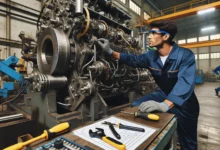Industrial Insurance Overview
Advertisement
Introduction
Industrial insurance is a type of insurance that provides coverage for businesses and organizations in cases of accidents, injuries, or other unexpected events that may occur in the workplace. It is designed to protect both employees and employers from financial losses that may result from workplace-related incidents. In this article, we will explore the ins and outs of industrial insurance, its strengths, weaknesses, and how it can benefit businesses of all sizes.
Industrial insurance, also known as workers’ compensation, is a crucial aspect of risk management for businesses. It helps ensure that employees are compensated for medical costs, lost wages, and other expenses resulting from workplace-related injuries. It also protects employers from potential lawsuits and legal fees that may arise from such incidents. By having industrial insurance in place, businesses can mitigate potential financial risks and keep their employees safe and protected.
One of the strengths of industrial insurance is that it provides financial security for employees who may suffer injuries or illnesses while on the job. This coverage can help them access necessary medical treatments and rehabilitation services without having to worry about the costs involved. Additionally, industrial insurance also offers wage replacement benefits for employees who are unable to work due to their injuries, ensuring that they can still support themselves and their families during recovery.
Another benefit of industrial insurance is that it helps promote a safe work environment. Knowing that employees are covered by insurance in case of an accident can incentivize businesses to implement proper safety measures and protocols to prevent workplace injuries. This, in turn, can lead to a reduction in accidents and incidents, creating a more productive and efficient workplace for everyone.
Despite its benefits, industrial insurance also has its weaknesses. One potential downside is the cost involved for businesses to acquire and maintain this type of insurance. Premiums can be high, especially for industries with higher risk factors, which can add to the overall operating expenses of a company. This cost burden can be a challenge for small businesses or startups with limited financial resources.
Another weakness of industrial insurance is the potential for fraudulent claims. Some employees may try to take advantage of the system by exaggerating injuries or falsifying information to receive benefits they are not entitled to. This can lead to increased premiums for businesses, as insurance companies may raise rates to cover the costs of fraudulent claims. Preventing and detecting fraud can be a time-consuming and costly process for both employers and insurers.
Additionally, industrial insurance may not cover all types of workplace-related incidents or injuries. Certain conditions, such as pre-existing injuries or illnesses, may be excluded from coverage, leaving employees vulnerable in such situations. It is essential for businesses to understand the limitations of their insurance policies and work with insurers to address any gaps in coverage that may exist.
Strengths of Industrial Insurance
1. Financial security for employees
Industrial insurance provides employees with financial security in case of workplace injuries or illnesses. This coverage helps them access necessary medical treatments and rehabilitation services without worrying about the costs involved.
2. Wage replacement benefits
In the event that an employee is unable to work due to their injuries, industrial insurance offers wage replacement benefits to ensure they can still support themselves and their families during the recovery process.
3. Promotes a safe work environment
Knowing that employees are covered by insurance can motivate businesses to implement safety measures and protocols to prevent workplace injuries. This promotion of safety can lead to a decrease in accidents and incidents, creating a more productive work environment.
4. Legal protection for employers
Industrial insurance protects employers from potential lawsuits and legal fees that may arise from workplace-related incidents. This coverage can help shield businesses from financial losses and reputational damage resulting from such claims.
5. Compliance with legal requirements
In many jurisdictions, industrial insurance is mandatory for businesses with employees. Maintaining this coverage ensures that companies comply with legal requirements and avoid penalties or fines for non-compliance.
6. Customizable coverage options
Industrial insurance policies can be tailored to the specific needs and risks of different industries and businesses. This customization allows companies to choose coverage options that align with their operations and exposures, providing comprehensive protection.
7. Peace of mind for everyone
Having industrial insurance in place gives peace of mind to employees, employers, and stakeholders. Knowing that financial protection is in place in case of unexpected events can reduce anxiety and uncertainty, leading to a more secure work environment for everyone involved.
Weaknesses of Industrial Insurance
1. Cost burden for businesses
One of the main weaknesses of industrial insurance is the cost involved for businesses to acquire and maintain this coverage. Premiums can be high, especially for industries with higher risk factors, which can add to the overall operating expenses of a company.
2. Potential for fraudulent claims
Another weakness of industrial insurance is the potential for fraudulent claims. Some employees may try to take advantage of the system by exaggerating injuries or falsifying information to receive benefits they are not entitled to. This can lead to increased costs for businesses and insurers.
3. Coverage limitations
Industrial insurance may not cover all types of workplace-related incidents or injuries. Certain conditions, such as pre-existing injuries or illnesses, may be excluded from coverage, leaving employees vulnerable in such situations.
4. Administrative complexities
Managing industrial insurance claims and compliance can be a complex and time-consuming process for businesses. Navigating regulations, filing paperwork, and communicating with insurers can be challenging, especially for companies without dedicated resources for these tasks.
5. Lack of transparency
Some employees and employers may find industrial insurance policies and processes unclear or confusing, leading to misinterpretations and disputes. Ensuring transparency and clear communication between all parties involved is crucial to avoid misunderstandings and conflicts.
6. Limited flexibility
Industrial insurance policies can be rigid in terms of coverage options and requirements. Some businesses may find that their needs evolve over time, requiring adjustments to their insurance policies. Lack of flexibility in coverage can be a limitation for companies seeking more tailored solutions.
7. Gaps in coverage
Despite the comprehensive nature of industrial insurance, there may still be gaps in coverage that leave certain risks unaddressed. Identifying and addressing these gaps is essential for companies to ensure they are adequately protected in all areas of their operations.
Industrial Insurance Overview Table
| Aspect | Description |
|---|---|
| Definition | Provides coverage for businesses in cases of accidents and injuries |
| Benefits | Financial security for employees, legal protection for employers |
| Weaknesses | Cost burden, potential for fraudulent claims, coverage limitations |
| Compliance | Required in many jurisdictions for businesses with employees |
| Customization | Options to tailor coverage to specific industry needs |
| Peace of mind | Reduces anxiety and uncertainty for all stakeholders |
FAQs About Industrial Insurance
1. What is industrial insurance?
Industrial insurance, also known as workers’ compensation, is a type of insurance that provides coverage for businesses and organizations in cases of accidents, injuries, or other unexpected events that may occur in the workplace.
2. Who needs industrial insurance?
Industrial insurance is typically required for businesses with employees, as it helps protect both workers and employers from financial losses resulting from workplace-related incidents.
3. What does industrial insurance cover?
Industrial insurance covers medical costs, lost wages, rehabilitation services, and other expenses that may arise from workplace injuries or illnesses.
4. How are industrial insurance premiums calculated?
Industrial insurance premiums are often calculated based on the size of the business, the industry it operates in, the number of employees, and the previous claims history.
5. Can employees choose their own doctors under industrial insurance?
Employees covered by industrial insurance may be required to seek treatment from approved healthcare providers within the insurance network. Some policies may allow for limited flexibility in choosing doctors.
6. What should employers do in case of a workplace injury?
Employers should immediately report any workplace injury to their insurance provider and assist the injured employee in accessing medical care and filing a claim for benefits.
7. How can businesses mitigate risks associated with industrial insurance?
Businesses can mitigate risks by implementing safety protocols, training employees on safe practices, maintaining a clean work environment, and staying informed about insurance policies and requirements.
Conclusion
Industrial insurance plays a vital role in protecting businesses and employees from financial losses and legal liabilities associated with workplace-related incidents. While it offers numerous benefits such as financial security, legal protection, and peace of mind, industrial insurance also has its challenges, including cost burdens, coverage limitations, and administrative complexities. By understanding the strengths and weaknesses of industrial insurance, businesses can make informed decisions about their risk management strategies and ensure they have the right coverage in place.
It is crucial for businesses to work closely with insurance providers, review their policies regularly, and address any gaps in coverage to minimize risks and maximize protection. Investing in a comprehensive industrial insurance plan can offer long-term benefits for businesses by safeguarding their assets, reputation, and most importantly, their employees.
Take action today to assess your industrial insurance needs, explore coverage options, and secure the protection your business deserves. By being proactive and diligent in managing risks, you can create a safer, more resilient workplace for everyone.
Remember, industrial insurance is not just a legal requirement—it is a strategic investment in the future of your business.
Disclaimer: The information provided in this article is for general informational purposes only and should not be considered legal or financial advice. It is recommended to consult with a qualified insurance professional to understand your specific industrial insurance needs and requirements.









